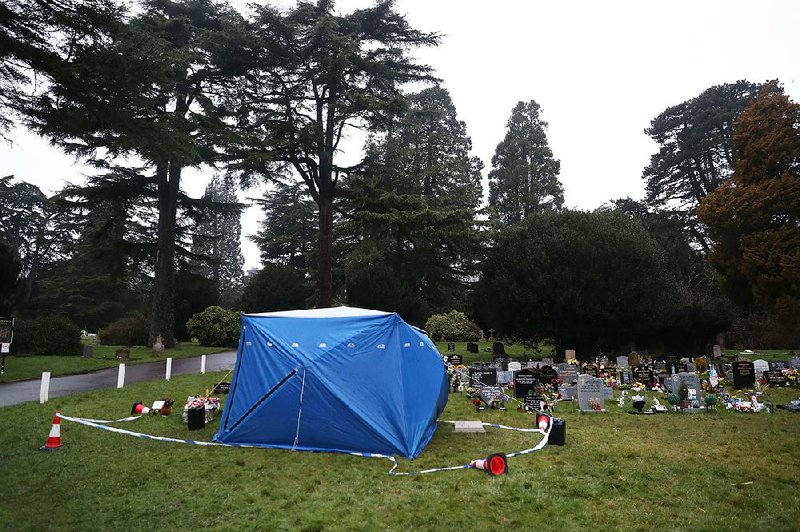LONDON -- Dozens of troops trained in chemical warfare were deployed on the streets of the English city of Salisbury on Friday as part of the investigation into the nerve-agent poisoning of a former Russian spy and his daughter.
The sight of the soldiers, and forensic experts in bright yellow hazardous-materials suits, added to the increasingly surreal scenes in a city best known for its towering medieval cathedral and its proximity to the ancient Stonehenge monument.
Sergei Skripal and his daughter Yulia, 33, were found unconscious Sunday on a city bench near the River Avon. They remained in critical condition in a hospital Friday, poisoned with what authorities say is a nerve agent.
A police officer who helped investigate was in serious condition, and a total of 21 people have received medical treatment tied to the case.
Skripal, a former Russian military intelligence officer, was convicted in 2006 of spying for Britain and was released by Moscow in 2010 as part of a spy swap. The 66-year-old former agent had been living in Salisbury, 90 miles southwest of London.
Counterterrorism detectives are leading the investigation. One line of inquiry is whether the pair were poisoned at Skripal's suburban house before going out for Sunday lunch and a visit to a pub.
On Friday, police called in about 180 marines, soldiers and air force personnel with expertise in chemical weapons, decontamination and logistics to help with the probe and to remove vehicles that might be contaminated. Military vehicles arrived at Salisbury District Hospital, where the victims are being treated, to take away a police car.
Authorities say there is no risk to the general public from the attack. Unlike radioactive poisons, nerve agents dissipate quickly.
Detectives were retracing the Skripals' movements as they try to discover how the toxin was administered and where it was manufactured.
Authorities cordoned off Skripal's house, a car, a restaurant, a pub and the cemetery where Skripal's wife, Lyudmila, is buried and where there is also a memorial headstone for his son, Alexander.
Lyudmila Skripal died of cancer in 2012. Alexander died last year at the age of 43. The cause is unclear: Some reports say he died in a car accident while on holiday in Russia, others that he died of liver failure.
At the graveyard, forensic officers in protective gear could be seen erecting a blue tent Friday.
Former London Police Chief Ian Blair said Friday that the police officer who is seriously ill had visited Skripal's house -- suggesting that the nerve agent was delivered there.
Blair told BBC radio that detective Sgt. Nick Bailey had "actually been to the house, whereas there is a doctor who looked after the patients in the open who hasn't been affected at all. There may be some clues floating around in here."
Highly toxic and banned in almost all countries, nerve agents require expertise to manufacture -- leading some to suspect whoever poisoned Skripal had the backing of a state.
"A well-equipped lab and a very experienced analytical chemist can do it, but it's not the sort of thing a chancer doing kitchen-sink chemistry can get away with," chemical weapons expert Richard Guthrie said.
Russian Foreign Minister Sergey Lavrov said Moscow might be willing to help with the investigation, but he expressed resentment at suggestions that the Kremlin was behind the attack.
"We're accused not only of this, but we are accused of everything that goes wrong on this planet, according to our Western partners," Lavrov said.
"If anyone's interested in our assistance with the investigation, whether it be on the poisoning of some subjects of the United Kingdom, or rumors on the interference in the affairs of the United States during the election campaign, or anything else. If you really need help from Russia, then we will be ready to consider such a possibility, if we do have relevant data," he said, speaking in Addis Ababa, Ethiopia.
The U.K. has vowed to take strong action against whoever is responsible for the "brazen and reckless" attack. British authorities say it's too soon to lay blame, but suspicions have fallen on Russia.
Information for this article was contributed by Danica Kirka and Jim Heintz of The Associated Press.
A Section on 03/10/2018

